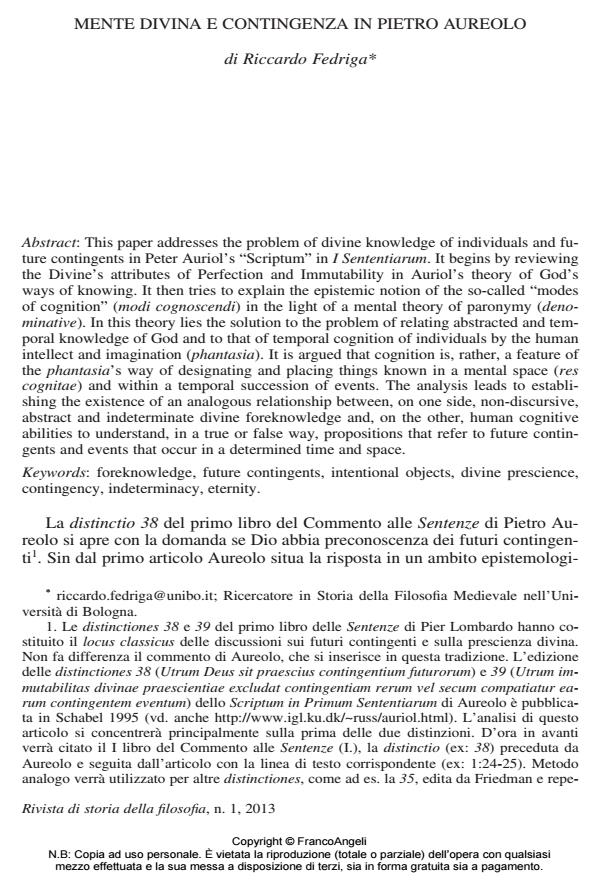Mente divina e contingenza in Pietro Aureolo
Titolo Rivista RIVISTA DI STORIA DELLA FILOSOFIA
Autori/Curatori Riccardo Fedriga
Anno di pubblicazione 2013 Fascicolo 2013/1
Lingua Italiano Numero pagine 25 P. 149-173 Dimensione file 608 KB
DOI 10.3280/SF2013-001008
Il DOI è il codice a barre della proprietà intellettuale: per saperne di più
clicca qui
Qui sotto puoi vedere in anteprima la prima pagina di questo articolo.
Se questo articolo ti interessa, lo puoi acquistare (e scaricare in formato pdf) seguendo le facili indicazioni per acquistare il download credit. Acquista Download Credits per scaricare questo Articolo in formato PDF

FrancoAngeli è membro della Publishers International Linking Association, Inc (PILA), associazione indipendente e non profit per facilitare (attraverso i servizi tecnologici implementati da CrossRef.org) l’accesso degli studiosi ai contenuti digitali nelle pubblicazioni professionali e scientifiche.
This paper addresses the problem of divine knowledge of individuals and future contingents in Peter Auriol’s "Scriptum" in I Sententiarum. It begins by reviewing the Divine’s attributes of Perfection and Immutability in Auriol’s theory of God’s ways of knowing. It then tries to explain the epistemic notion of the so-called "modes of cognition" (modi cognoscendi) in the light of a mental theory of paronymy (denominative). In this theory lies the solution to the problem of relating abstracted and temporal knowledge of God and to that of temporal cognition of individuals by the human intellect and imagination (phantasia). It is argued that cognition is, rather, a feature of the phantasia’s way of designating and placing things known in a mental space (res cognitae) and within a temporal succession of events. The analysis leads to establishing the existence of an analogous relationship between, on one side, non-discursive, abstract and indeterminate divine foreknowledge and, on the other, human cognitive abilities to understand, in a true or false way, propositions that refer to future contingents and events that occur in a determined time and space.
Parole chiave:Foreknowledge, future contingents, intentional objects, divine prescience, contingency, indeterminacy, eternity.
Riccardo Fedriga, Mente divina e contingenza in Pietro Aureolo in "RIVISTA DI STORIA DELLA FILOSOFIA" 1/2013, pp 149-173, DOI: 10.3280/SF2013-001008